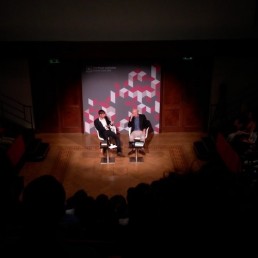Mon 11-Jun-2018
The innocent and perhaps slightly dull title hid one of the more exciting RI events in recent weeks: an acclaimed author, “immersive” journalist (“when I was researching the food industry, I bought a cow”), and a UC Berkeley professor Michael Pollan was talking about his most recent book (carrying an innocent and perhaps slightly dull title “how to change your mind”…) about psychedelic substances, in particular psilocybin and LSD.
Psychedelics are currently enjoying a true (academic) renaissance. After half a century of complete obscurity (not to mention criminalisation), they are resurfacing in respected universities’ research facilities (subject to unbelievable admission rigours and control protocols, not to mention procurement), and receiving strong support from foremost academics as potential game-changers in psychiatry as well as cognitive performance enhancers. Ongoing legalisation of cannabis and shifting public perception of drugs’ harmfulness may be the catalysts.

Among the world-class academics leading the debate and the research are Prof. David Nutt of Imperial College London, who published a now-famous (re)classification of drugs based on their harmfulness in 2009, and was sacked by the Labour (sic!) government shortly thereafter, and Prof. Barbara Sahakian of Cambridge University, who – among many other things – is researching performance enhancement and “smart drugs” (you can buy her book on the topic here).
With mental illness spiralling, a prospect of single (supervised) application of LSD or psilocybin generating results comparable to *years* of traditional therapies was probably what interested the scientific community (you can watch Prof. Nutt’s presentation given at UCL’s Society for the Application of Psychedelics event in Nov-2017 here, it’s fascinating – you can hear me asking his views on legalisation towards the end). Silicon Valley – in its true “quantified self”, entrepreneurial, and somewhat quirky style – responded to “performance enhancement” (the concept of performance-enhancing “microdosing” was brought into public’s attention in a famous Sep-2016 Wired UK article you can read here; another well-known feature is the Aug-2017 article in the FT you can read here.)
Against this backdrop, any presentation on LSD and / or psilocybin is pretty much a guaranteed full house*, and this one was no exception. There were unusually many first-time-ever attendees (RI did a quick show of hands), many of which were friendly, Big Lebowski-style dudes with very long hair and an aversion to footwear. The event was MC’d by Dr. Robin Carhart-Harris, who is one of the rising stars of the younger generation of psychedelic research (you can watch him give his own presentation at UCL’s Society for the Application of Psychedelics event in Feb-2018 (a sequel to Prof. Nutt’s event) here).
Michael Pollan proved to be an experienced, engaging, and charismatic speaker, which definitely contributed to the quality of the event. In his presentation he talked about his (informal, and, by his own admission, at times not entirely legal) research and experiences of psychedelic substances, as well as experiences and views of other people who – for very different reasons – tried psychedelics.
The focus of his talk were mental health and related experiences, not on performance enhancement, which made it a little more profound (particularly the part about terminal patients confronting their fear of imminent death) than it would be otherwise. He stated, matter-of-factly, that the single guided LSD experience he had under the care of an experienced therapist (who takes huge personal risks by running such clandestine sessions) did for him what would take conventional therapy years to accomplish.
Another interesting point raised by Michael was the deep sense of closeness and togetherness with nature being the result of psychedelic experiences. I don’t recall this argument appearing in the public discourse, usually it’s just depression and performance enhancement, which made it all the more interesting.
The event went well into overtime with extended Q&A (you can hear me asking his views on legalisation towards the end) and will hopefully be uploaded to Royal Institution’s YouTube channel.
You can see upcoming RI events here, and make a small contribution here.
